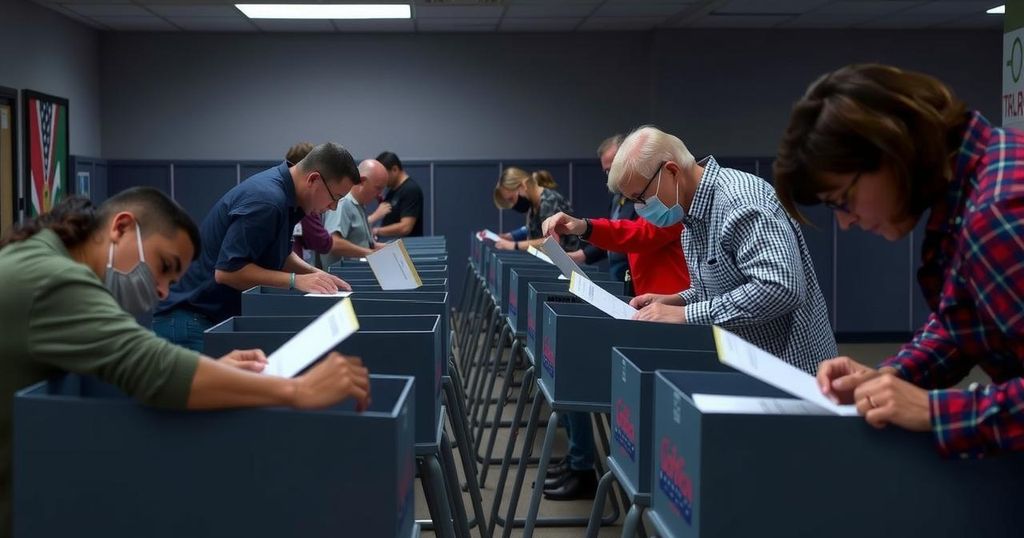Georgia’s Pivotal Election: A Defining Moment for Democratic Aspirations and European Integration

Georgians voted in a critical parliamentary election that may determine their future direction towards European Union membership or authoritarianism. Accusations of intimidation marred the election, with the ruling Georgian Dream party, aligned with Russia, threatening opposition accountability. Public sentiment strongly favors EU integration, but recent government actions have stymied this momentum, reflecting deep divisions within the country.
On a pivotal election day, Georgian citizens cast their votes in a highly contentious parliamentary election that many believe could significantly shape the nation’s future. Actions from the ruling party, Georgian Dream, which is perceived as aligned with Russian interests, have raised concerns regarding the potential erosion of democratic freedoms and the possibility that this could be the last free election in Georgia. The pre-election climate has been marked by allegations of intimidation towards voters, with many feeling pressured to support the ruling party. Furthermore, Bidzina Ivanishvili, the party’s founder and a billionaire with extensive ties to Russia, threatened to hold opposition parties accountable for supposed ‘war crimes,’ without clarifying the specifics of these allegations. The electorate faces the crucial task of selecting 150 lawmakers from 18 parties, needing at least 76 seats to form a new government. Many Georgians perceive this as a vital opportunity to reaffirm their desire for European Union membership and to divert away from authoritarianism. President Salome Zourabichvili characterized this as an “existential election” for Georgia. With public opinion showing approximately 80% support for EU integration, there exists substantial hope and demand for a return to progress towards EU membership. The opposition parties, however, have not united as requested by the president but have committed to her outlined reforms necessary for EU accession. Despite the ruling party’s legislative actions that have stalled Georgia’s EU aspirations, they have countered with pro-EU rhetoric and campaigns accentuating the differentiation between life in Georgia and the turmoil evident in Ukraine. While local sentiments reflect a consciousness of Georgia’s fraught history with Russia, particularly concerning territorial losses in Abkhazia and South Ossetia, voters are faced with a choice that many argue goes beyond simple alignment with East or West. For the ruling party, the upcoming election serves as both a referendum on their governance and a critical juncture for the future trajectory of Georgia. The context surrounding these elections suggests that the implications extend far beyond immediate political gains, resonating strongly with the citizens’ aspirations for national sovereignty and democratic integrity.
The parliamentary elections in Georgia are critical not only for domestic governance but also for the country’s aspirations for European integration. With a population of approximately 3.7 million, public sentiment is largely in favor of joining the EU, supported by constitutional obligations guiding the government’s foreign policy direction. However, many citizens express concern over the ruling party, Georgian Dream, which is seen as increasingly authoritarian and close to Russian influence. Recent actions by the government, including a controversial ‘Russian law’ that limits freedom of speech, have led to delays in Georgia’s EU membership aspirations. The pre-election atmosphere has been charged with accusations against the ruling party regarding intimidation and coercion, signaling a deep political divide within the nation. The election is perceived as a possible turning point for democratic values and the pursuit of European alignment.
The parliamentary elections in Georgia represent a critical juncture in the nation’s quest for democratic governance and European integration. As citizens navigate a charged political landscape marked by allegations of intimidation and the potential for authoritarian governance, the outcome of this election will significantly influence Georgia’s future direction. With the ruling party seeking to consolidate power and the opposition rallying for democratic reforms, voters are faced with decisions that may define the country’s alignment with Europe or a regression towards Russian influence.
Original Source: www.euronews.com








